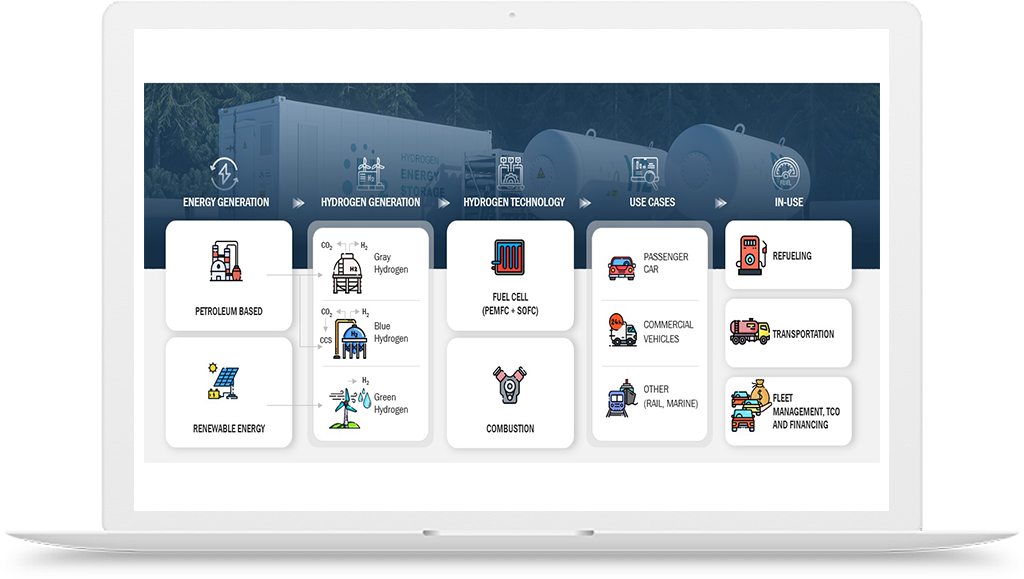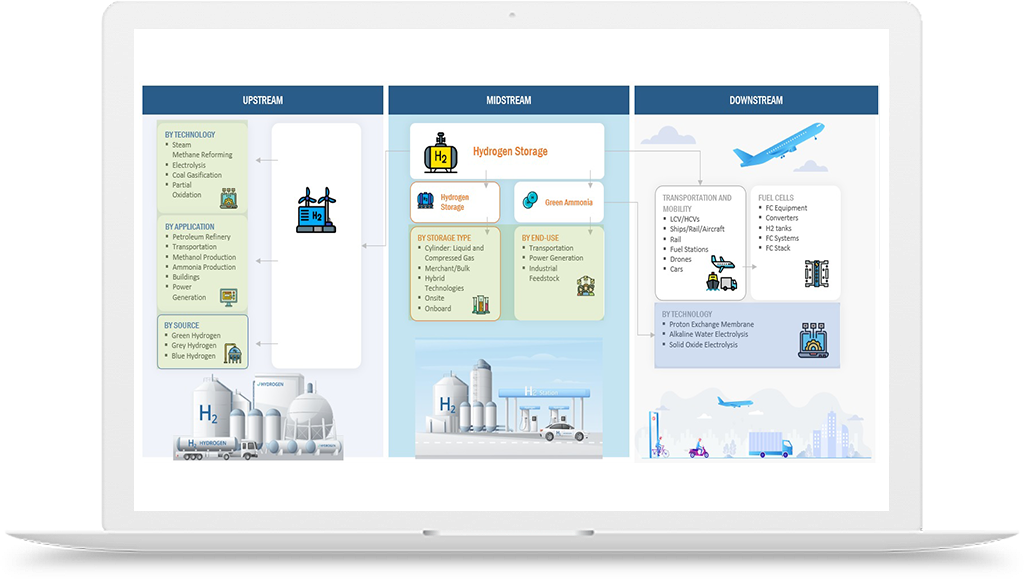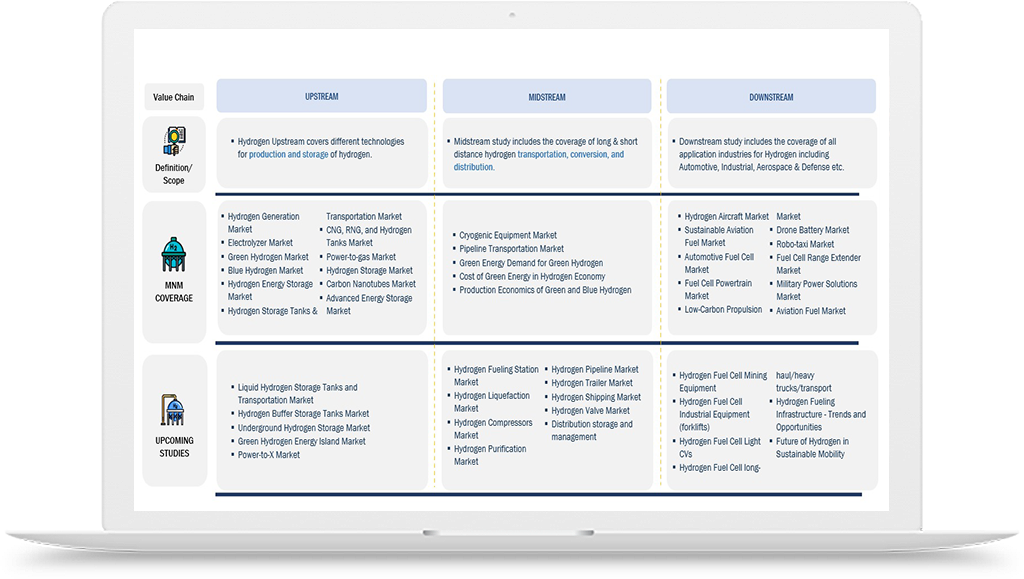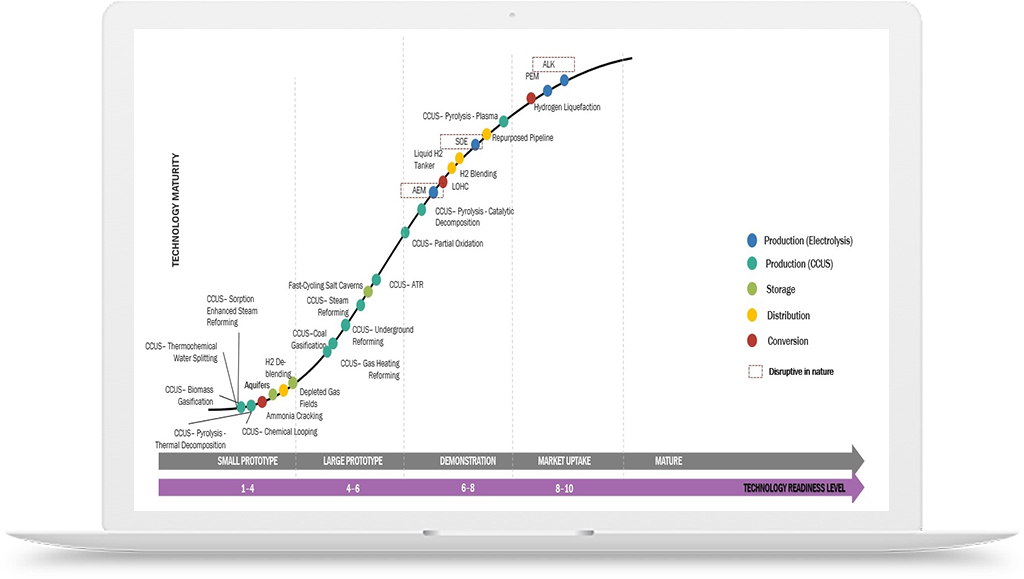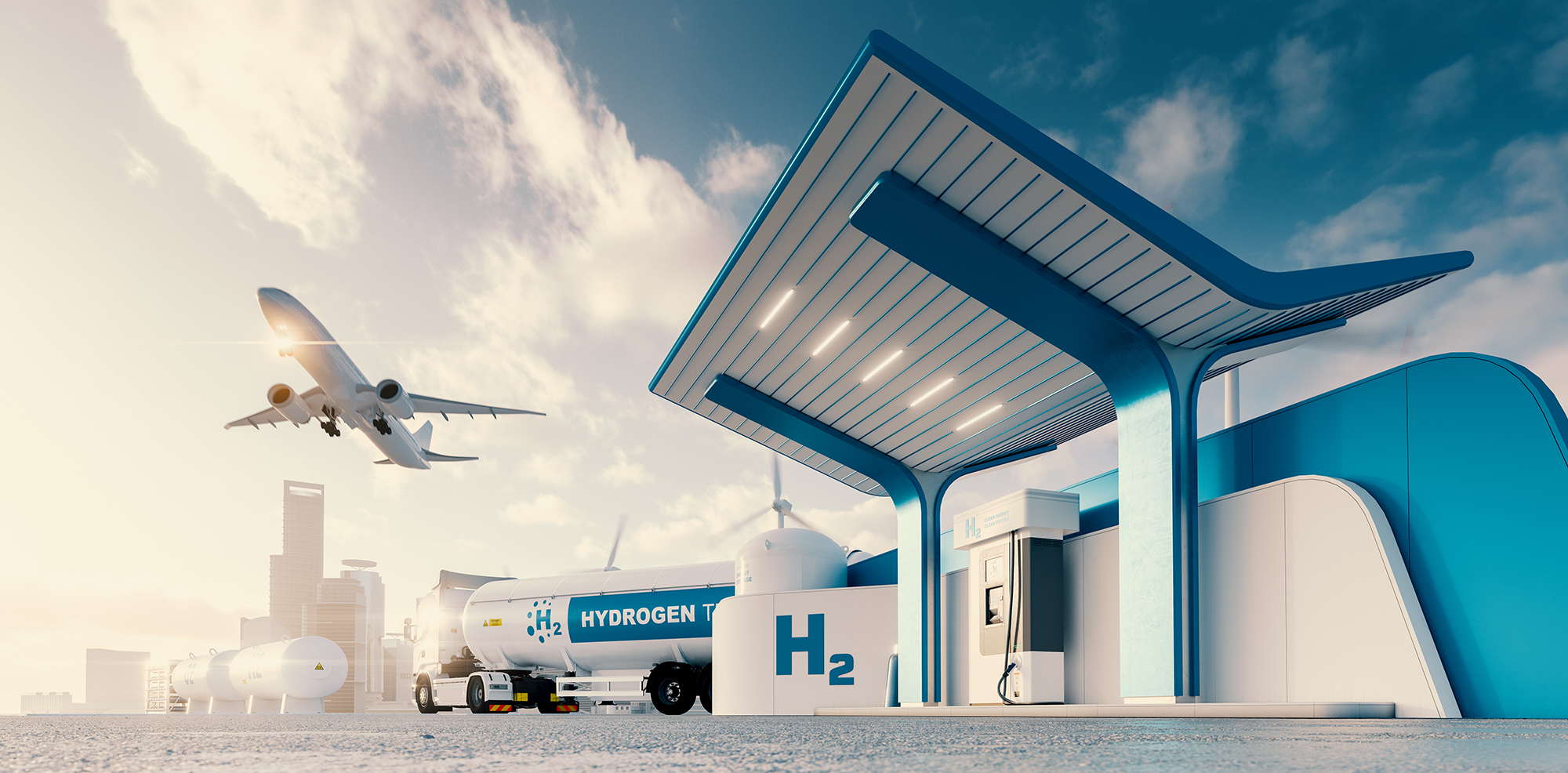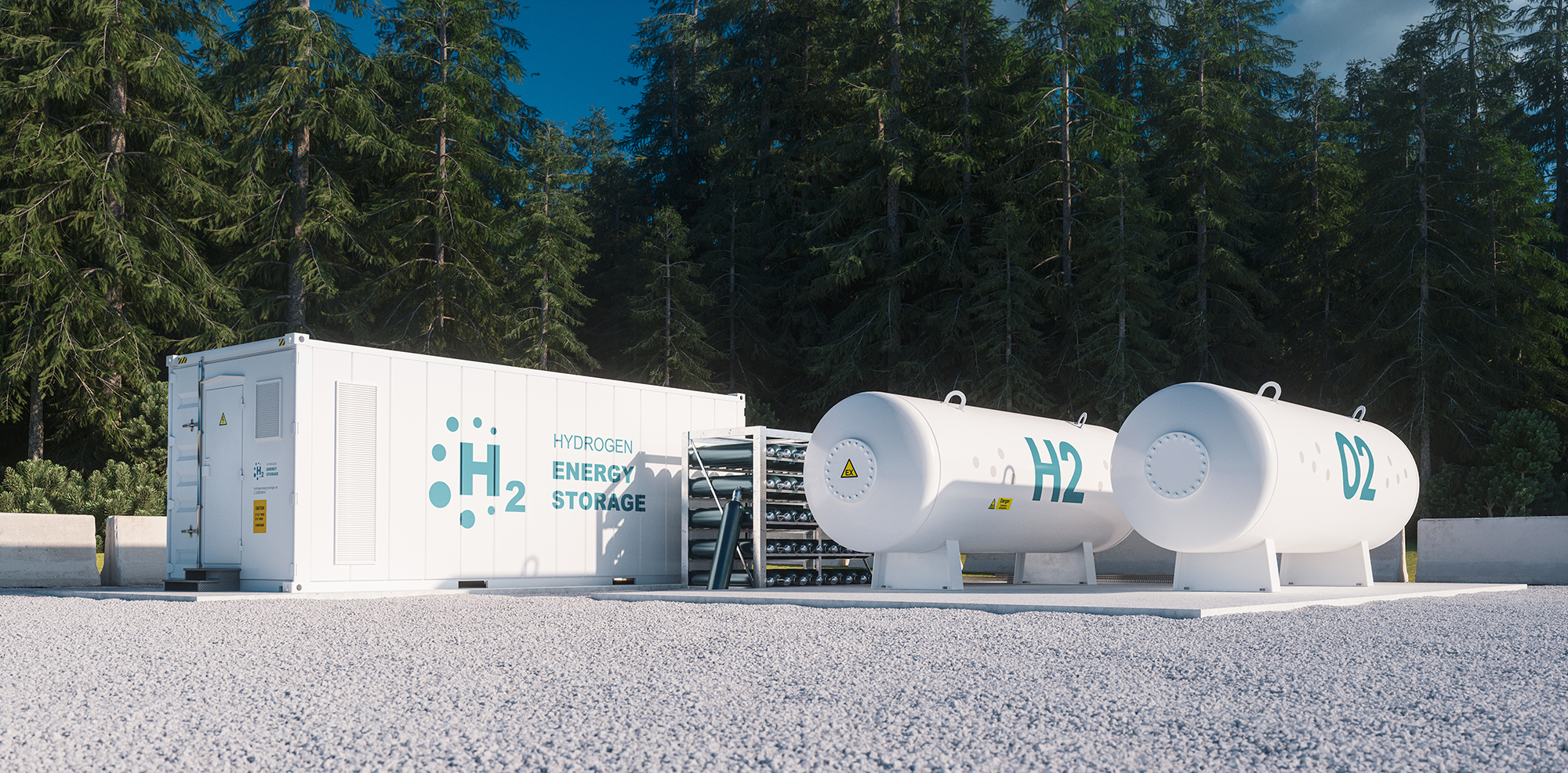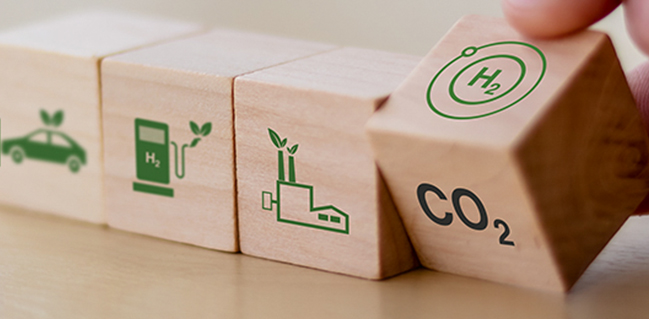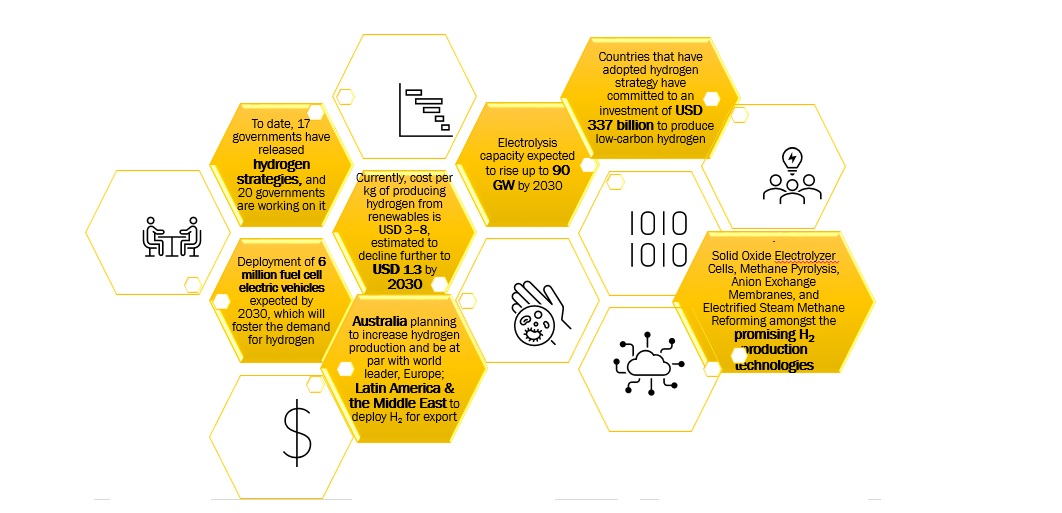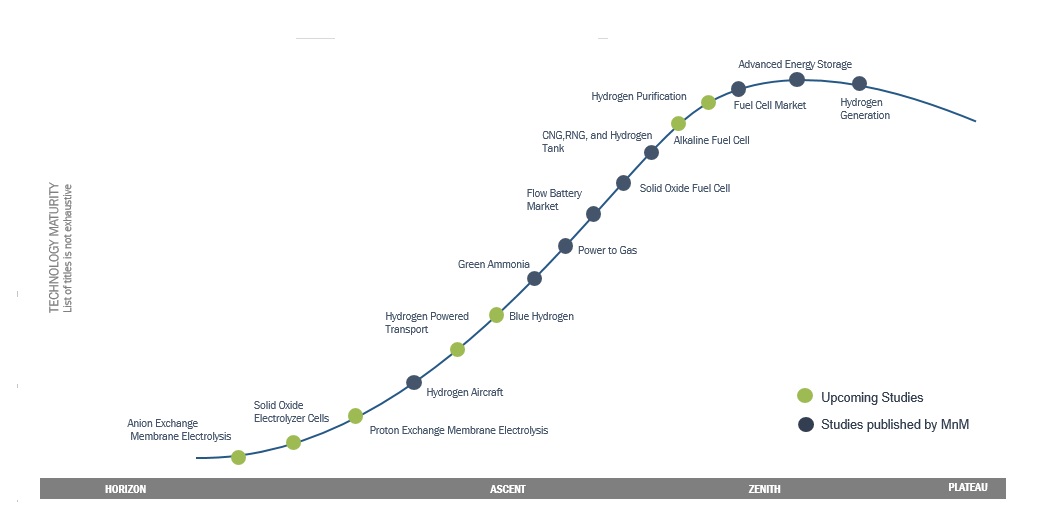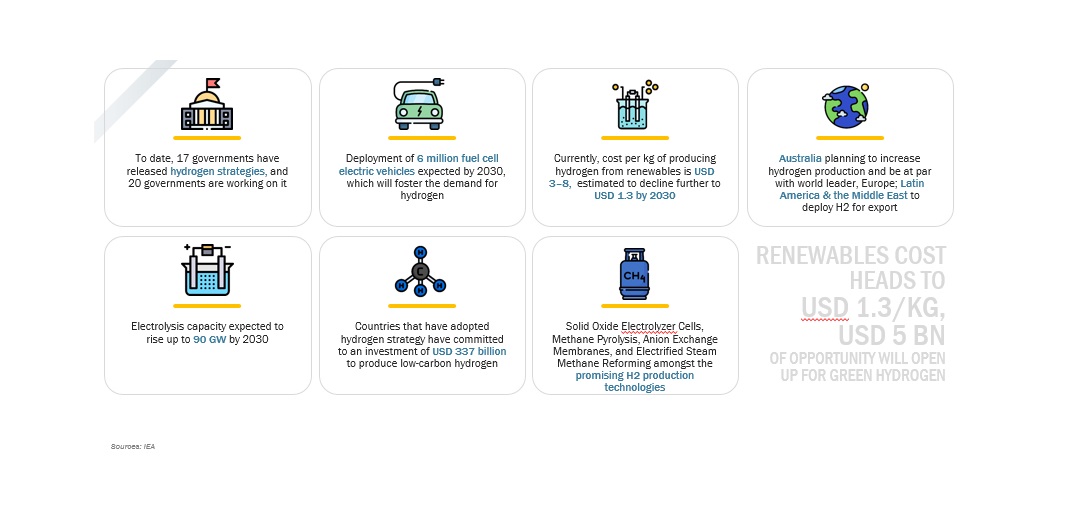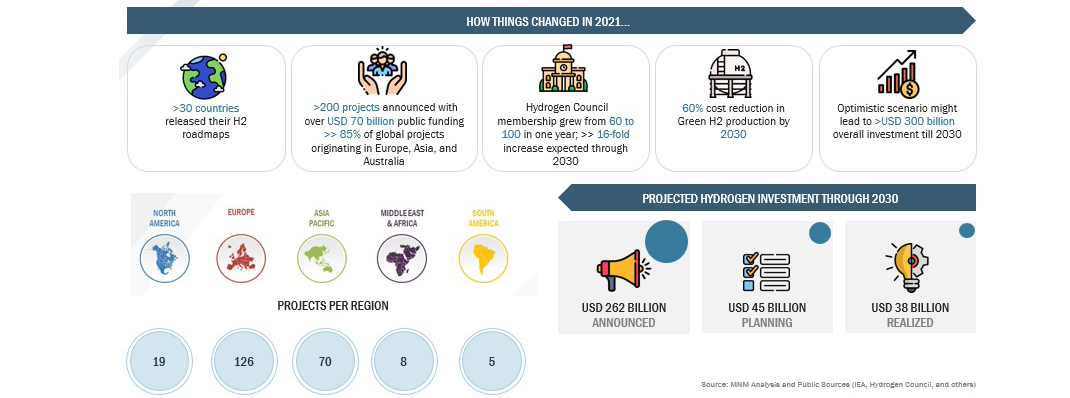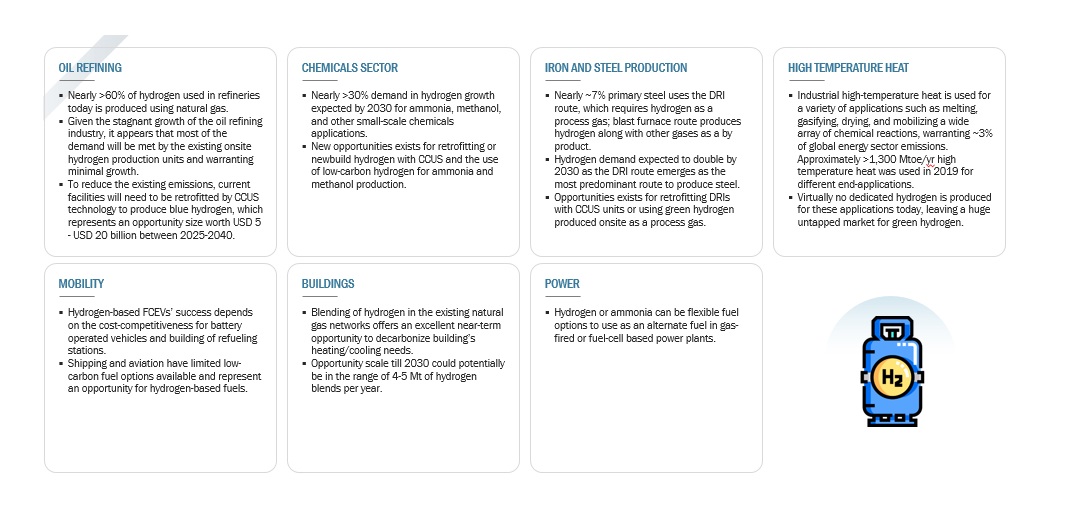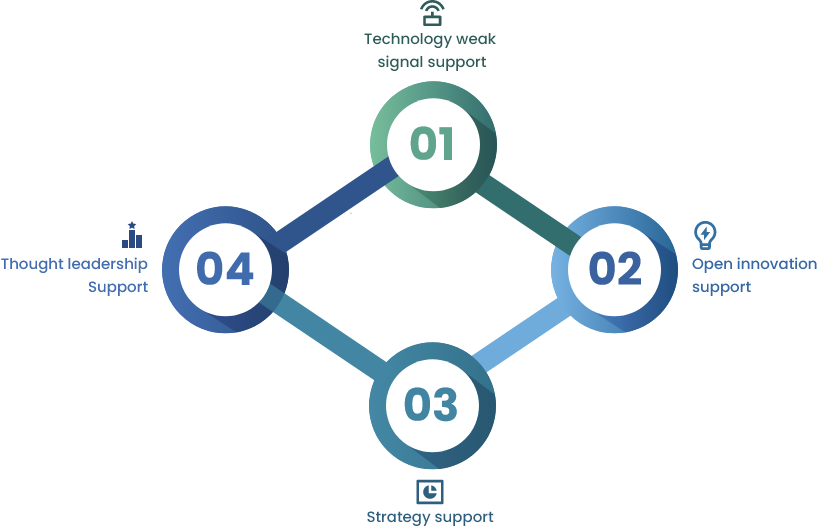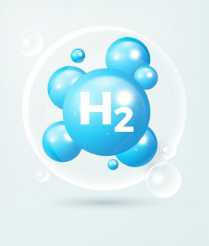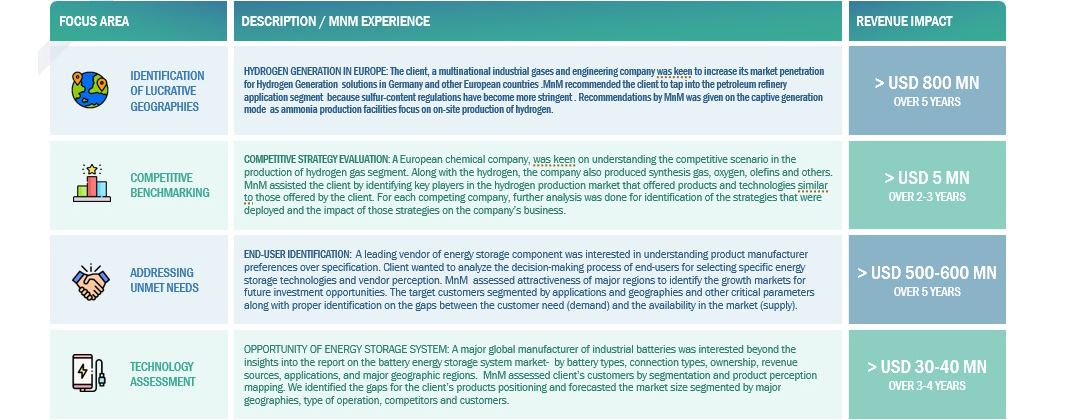Hydrogen plays a crucial role as an energy carrier in the envisioned Hydrogen Future. As a versatile and clean
energy
carrier, hydrogen offers several advantages that position it as a key component of the future energy landscape. Here
are some key aspects highlighting the significance of hydrogen as an energy carrier.
- Energy Storage and Flexibility: Hydrogen serves as a means to store and transport energy effectively. It can be
produced from various sources, including renewable energy, through processes like electrolysis. The stored
hydrogen can then be utilized on-demand, offering flexibility to balance intermittent renewable energy
generation and meet varying energy demands. This energy storage capability of hydrogen makes it invaluable for
grid integration and reliable power supply in the hydrogen future.
- Clean and Sustainable Energy: Hydrogen is a clean and sustainable energy carrier. When produced using renewable
energy sources, such as wind or solar power, it results in "green hydrogen" with zero greenhouse gas emissions.
Green hydrogen can replace fossil fuels in various sectors, including transportation, industry, and power
generation, contributing to substantial emissions reduction and combating climate change.
- Versatility and Sector Integration: Hydrogen exhibits exceptional versatility across multiple sectors. It can be
used in fuel cells to generate electricity for transportation, stationary power, and portable applications.
Hydrogen can also be utilized in industrial processes, replacing fossil fuels for heat and feedstock purposes.
Moreover, hydrogen can support power generation through grid balancing and energy storage. This versatility
allows hydrogen to integrate seamlessly into existing and future energy systems, fostering a diverse and
sustainable energy mix.
- Decarbonization Potential: The hydrogen future offers tremendous potential for decarbonization. By replacing
fossil fuels in various sectors, hydrogen can significantly reduce greenhouse gas emissions and air pollution.
It enables the transition to a low-carbon economy and supports the achievement of ambitious climate targets. The
use of hydrogen in heavy-duty transportation, industrial processes, and power generation can play a vital role
in decarbonizing these sectors and driving sustainable development.
- Technological Advancements and Cost Reduction: Ongoing advancements in hydrogen technologies, such as
electrolysis and fuel cells, coupled with economies of scale, are driving down costs. As these technologies
mature and reach commercial viability, the cost of hydrogen production, storage, and utilization is expected to
decrease further. This cost reduction, combined with supportive policies and investments, will contribute to the
widespread adoption of hydrogen as an energy carrier in the future.
Importance of the hydrogen industry in the future energy landscape
The hydrogen industry holds immense importance in shaping the future energy landscape, particularly in the context
of
the "Hydrogen Future." As the world seeks sustainable and clean energy solutions, hydrogen emerges as a key enabler
for a successful transition. Here are key reasons highlighting the significance of the hydrogen industry in the
future energy landscape.
- Decarbonization and Climate Change Mitigation: The hydrogen industry plays a crucial role in decarbonizing
various sectors of the economy. By replacing fossil fuels, hydrogen enables a significant reduction in
greenhouse gas emissions. When produced from renewable sources, such as wind or solar power, hydrogen becomes
"green hydrogen," offering a carbon-neutral or even carbon-negative energy option. This potential for emissions
reduction positions hydrogen as a powerful tool in mitigating climate change and achieving global climate
targets.
- Energy Storage and Grid Flexibility: Hydrogen's ability to store and release energy efficiently makes it a vital
component of a flexible and resilient energy system. By storing excess renewable energy as hydrogen through
processes like electrolysis, it becomes possible to balance intermittent renewable energy generation and address
peak demand periods. This energy storage capability helps to stabilize the grid, enhance grid resiliency, and
ensure reliable power supply, especially when coupled with renewable energy sources.
- Sector Integration and Diversification: The hydrogen industry facilitates the integration and diversification of
energy use across various sectors. It can be utilized in transportation, industry, power generation, and even
for heating and cooking purposes. Hydrogen's versatility allows for its integration into existing energy
infrastructure, including pipelines and storage facilities, enabling a smooth transition to a "hydrogen future."
By diversifying energy sources, the hydrogen industry reduces dependency on a single energy resource, fostering
energy security and resilience.
- Industrial Transformation and Economic Opportunities: The hydrogen industry presents substantial opportunities
for economic growth, job creation, and industrial transformation. The production, storage, and distribution of
hydrogen require an extensive value chain, resulting in new business models, investments, and employment
opportunities. Moreover, the development of hydrogen technologies drives innovation and enhances the
competitiveness of industries involved in hydrogen-related activities. This economic potential positions the
hydrogen industry as a driver of sustainable economic development.
- Global Energy Transition: The global nature of the hydrogen industry allows for international collaboration and
cooperation in addressing shared energy and climate challenges. Countries worldwide are recognizing the
potential of hydrogen and are actively investing in its development. International partnerships and initiatives
are emerging to facilitate knowledge sharing, policy harmonization, and the scaling up of hydrogen technologies.
The hydrogen industry fosters cross-border collaboration, driving a global energy transition towards a
sustainable and low-carbon future.
Hydrogen Future and its Significance
The abundance of hydrogen as an element is a pivotal factor in shaping the potential of the Hydrogen Future. With
hydrogen playing a central role as an energy carrier, its significant abundance holds remarkable implications.
Consider the following professional perspective, incorporating relevant statistics:
Hydrogen, the most abundant element in the universe, constitutes approximately 75% of its elemental mass (Source:
NASA). This abundance highlights hydrogen's pivotal position as a primary driver in the envisioned Hydrogen Future.
In future, the abundance of hydrogen is crucial for the following reasons:
- Sustainable and Renewable: Hydrogen production can leverage renewable sources, such as solar and wind power,
ensuring sustainable and low-carbon pathways. Electrolysis, the primary method of hydrogen production, can be
powered by renewable electricity. As of 2020, renewable energy accounted for over 26% of global electricity
generation (Source: International Renewable Energy Agency), further enhancing the viability of hydrogen as a
sustainable energy carrier.
- Global Availability: Hydrogen's global availability is significant for achieving energy security and reducing
dependence on limited or geographically constrained resources. With hydrogen production being decentralized,
countries can tap into their own resources, reducing reliance on imports. Currently, hydrogen production reaches
over 70 million tons globally per year (Source: Hydrogen Council), showcasing its potential as a widely
available energy carrier.
- Diverse Feedstocks: Hydrogen can be derived from diverse feedstocks, including water, biomass, and natural gas.
Water, the most abundant resource on Earth, provides a virtually limitless feedstock for hydrogen production.
Additionally, biomass and natural gas offer alternative pathways for hydrogen generation. As of 2020, biomass
accounted for around 14% of global final renewable energy consumption (Source: International Renewable Energy
Agency), highlighting the potential of diverse feedstocks for hydrogen production.
- Scalability: Hydrogen's abundance enables scalability, allowing for expanded production to meet growing demand.
The International Energy Agency projects that hydrogen production could grow to 530 million tons annually by
2050, up from the current 70 million tons (Source: International Energy Agency). Such scalability positions
hydrogen as a key energy carrier for sectors like transportation, industry, and power generation in the
"Hydrogen Future."
- Technological Advancements: The abundance of hydrogen has spurred significant advancements in production,
storage, and utilization technologies. Research and development efforts have led to more efficient electrolysis
processes, improved storage techniques, and enhanced fuel cell technologies. These advancements drive the
continuous optimization of hydrogen-related infrastructure and pave the way for the widespread adoption of
hydrogen as an energy carrier.
Environmental benefits of hydrogen in future as a clean energy source
Hydrogen, as a clean energy source, offers numerous environmental benefits that position it as a key component of
the
future energy landscape. Here are some of the significant environmental advantages of hydrogen:
- Zero Emissions: Hydrogen, when produced from renewable sources through electrolysis, generates no greenhouse gas
emissions during its use. (Source: International Renewable Energy Agency, "The Future of Hydrogen," 2019). When
used in fuel cells to produce electricity, the only byproduct is water vapor. This makes hydrogen a truly clean
and zero-emission energy carrier, contributing to mitigating climate change and improving air quality.
- Decarbonization: The widespread adoption of hydrogen can play a vital role in decarbonizing various sectors. By
replacing fossil fuels in transportation, industry, and power generation, hydrogen can significantly reduce
carbon dioxide (CO2) emissions. (Source: International Energy Agency, "The Future of Hydrogen," 2019). It offers
a pathway to decarbonize hard-to-abate sectors like heavy-duty transportation, aviation, and industrial
processes that are challenging to electrify directly.
- Air Quality Improvement: Hydrogen combustion or utilization in fuel cells produces no harmful air pollutants
such as particulate matter, nitrogen oxides (NOx), or sulfur dioxide (SO2). (Source: United States Department of
Energy, "Hydrogen and Fuel Cells: An Overview," 2021). The use of hydrogen in transportation and stationary
applications can lead to substantial improvements in local air quality, reducing respiratory diseases and
improving overall public health.
- Renewable Integration and Grid Stability: Hydrogen can serve as a valuable tool for integrating renewable energy
sources into the grid. It can absorb excess electricity generated from intermittent sources like solar and wind
power during periods of low demand. (Source: European Commission, "Hydrogen Strategy for a Climate-Neutral
Europe," 2020). This energy can then be stored as hydrogen and later converted back to electricity or utilized
for other energy-intensive applications when renewable generation is limited. This capability enhances grid
stability and helps balance the fluctuating nature of renewable energy.
- Energy Efficiency: Hydrogen-based systems, such as fuel cells, exhibit high energy conversion efficiencies
compared to traditional combustion-based technologies. Fuel cells can convert hydrogen into electricity with
efficiencies as high as 60% or more, depending on the specific application. (Source: National Renewable Energy
Laboratory, "Fuel Cell Handbook," 2019). This energy efficiency contributes to overall energy savings and
reduces overall resource consumption.
- Sustainable Transportation: Hydrogen fuel cell vehicles offer a sustainable alternative to conventional internal
combustion engine vehicles. They have a longer driving range and shorter refueling times compared to battery
electric vehicles. Hydrogen-powered vehicles emit only water vapor and have the potential to significantly
reduce greenhouse gas emissions from the transportation sector. (Source: California Air Resources Board,
"Zero-Emission Vehicle FAQs," 2022).
- Circular Economy Potential: Hydrogen can enable the development of a circular economy by facilitating the
recycling and reuse of materials. (Source: International Energy Agency, "The Future of Hydrogen," 2019). It can
be used in processes such as hydrogenation, enabling the conversion of waste materials or CO2 into useful
chemicals and fuels. This closed-loop approach reduces waste and promotes resource efficiency.
Versatility of hydrogen in various sectors
Hydrogen exhibits remarkable versatility as an energy carrier across multiple sectors, including transportation,
industry, and power generation, making it a key component of the envisioned Hydrogen Future. Here is an overview of
its versatility in each sector, with relevant citations and statistics:
- Transportation Sector:
- Hydrogen Fuel Cell Vehicles: Hydrogen can power fuel cell vehicles, offering long driving ranges and fast
refueling times. These vehicles emit only water vapor, contributing to a clean and sustainable
transportation solution. As of 2021, there were over 25,000 fuel cell vehicles on roads worldwide. (Source:
International Energy Agency, "The Future of Hydrogen," 2019)
- Heavy-Duty Vehicles: Hydrogen holds significant potential for decarbonizing heavy-duty transportation,
including trucks, buses, and trains. Hydrogen fuel cell trucks have a longer range and can carry heavier
payloads compared to battery electric trucks. (Source: European Commission, "Hydrogen Strategy for a
Climate-Neutral Europe," 2020)
- Industrial Sector:
- Industrial Processes: Hydrogen is a versatile feedstock and energy source for industrial applications such
as refining, chemical production, and steel manufacturing. Hydrogen can replace fossil fuels in these
processes, reducing greenhouse gas emissions. The global hydrogen demand for industry is projected to grow
from 120 million tonnes in 2020 to 167 million tonnes by 2030. (Source: Hydrogen Council, "Scaling Up
Hydrogen," 2021)
- Hydrogen for Heat: Hydrogen can be used for high-temperature heat applications in industries such as glass
manufacturing and steel production, helping to decarbonize these energy-intensive processes. (Source:
European Commission, "Hydrogen Strategy for a Climate-Neutral Europe," 2020)
- Power Generation:
- Fuel Cells: Hydrogen can be utilized in fuel cells to produce electricity with high efficiency and zero
emissions. Fuel cells are particularly suitable for decentralized power generation, backup power, and
portable applications. The global installed capacity of stationary fuel cells reached 1.2 GW in 2020.
(Source: Fuel Cell and Hydrogen Energy Association, "2019 Annual Report")
- Grid Balancing: Hydrogen can play a role in grid stability and renewable energy integration by storing
excess renewable electricity as hydrogen and converting it back to electricity during peak demand. The
potential global demand for hydrogen for grid balancing could reach 2,500-3,700 TWh per year by 2050.
(Source: International Renewable Energy Agency, "The Future of Hydrogen," 2019)
Overview of the existing hydrogen infrastructure
The existing hydrogen infrastructure forms a critical foundation for the envisioned Hydrogen Future, enabling the
production, storage, transportation, and utilization of hydrogen as a clean energy carrier.
- Hydrogen Production:
- Steam Methane Reforming: Currently, the most common method for hydrogen production is steam methane
reforming (SMR), accounting for around 95% of global hydrogen production. (Source: International Energy
Agency, "The Future of Hydrogen," 2019)
- Electrolysis: Electrolysis, which uses electricity to split water into hydrogen and oxygen, is gaining
momentum as a clean method of hydrogen production. As of 2020, the global electrolyzer capacity was
approximately 1.3 GW, with a significant growth trajectory expected. (Source: International Renewable Energy
Agency, "Green Hydrogen Cost Reduction Potential," 2020)
- Hydrogen Storage and Transportation:
- Compressed Hydrogen: Hydrogen can be compressed and stored in high-pressure tanks, enabling its
transportation over short to medium distances. Compressed hydrogen storage is well-established and widely
used, especially for industrial applications. (Source: Fuel Cell and Hydrogen Energy Association, "Hydrogen
and Fuel Cells: The Road Ahead," 2020)
- Liquid Hydrogen: Liquid hydrogen, stored at extremely low temperatures (-253°C), allows for higher
energy density and longer transportation distances. It is primarily used in aerospace and specialized
applications. (Source: National Renewable Energy Laboratory, "Hydrogen Analysis Production Model," 2019)
- Hydrogen Pipelines: Hydrogen pipelines exist in certain regions, facilitating the transportation of hydrogen
over longer distances. For example, the United States has over 1,600 miles (2,575 kilometers) of hydrogen
pipelines. (Source: Department of Energy, "Hydrogen Pipeline Infrastructure Assessment," 2013)
- Hydrogen Utilization:
- Fuel Cells: Fuel cells convert hydrogen into electricity and heat through an electrochemical process,
offering high efficiency and zero emissions. Fuel cell systems are deployed in various applications,
including transportation, stationary power, and portable devices. (Source: Fuel Cell and Hydrogen Energy
Association, "Fuel Cells and Hydrogen Energy: 2021 Industry Review")
- Hydrogen Combustion: Hydrogen can be combusted in conventional internal combustion engines with minor
modifications or used in gas turbines for power generation. These technologies can provide flexibility in
the transition to a hydrogen-based energy system. (Source: International Energy Agency, "The Future of
Hydrogen," 2019)
- Existing Hydrogen Infrastructure Scale:
- Hydrogen Production Capacity: As of 2021, the global hydrogen production capacity exceeded 110 million tons
per year, with the majority derived from fossil fuels. (Source: International Energy Agency, "The Future of
Hydrogen," 2019)
- Hydrogen Refueling Stations: Globally, there are over 500 operational hydrogen refueling stations, with
countries like Japan, Germany, and the United States leading in deployment. (Source: International
Association for Hydrogen Energy, "World Fuel Cell Council Statistical Review 2021")
Progress in Hydrogen production technologies
Significant progress has been made in hydrogen production technologies, driven by the vision of a sustainable
Hydrogen Future. Advancements have been observed in electrolysis, steam methane reforming (SMR), and other
innovative approaches. Here, we discuss the progress made in these key hydrogen production technologies, emphasizing
their potential:
- Electrolysis:
- Proton Exchange Membrane (PEM) Electrolysis: PEM electrolysis has witnessed remarkable advancements,
enabling efficient hydrogen production through the use of solid polymer electrolyte membranes. The
technology offers high flexibility, fast response times, and scalability. Over the past decade, the cost of
PEM electrolysis systems has decreased by approximately 60%. (Source: International Renewable Energy Agency,
"Green Hydrogen Cost Reduction Potential," 2020)
- Alkaline Electrolysis: Alkaline electrolysis has been a well-established technology for hydrogen production,
primarily in industrial applications. Ongoing research and development efforts focus on improving efficiency
and reducing costs. Alkaline electrolyzer installations have already reached multi-megawatt scale. (Source:
International Energy Agency, "The Future of Hydrogen," 2019)
- Steam Methane Reforming (SMR):
- Carbon Capture and Storage (CCS): SMR, coupled with carbon capture and storage (CCS), offers the potential
for low-carbon hydrogen production by capturing and sequestering CO2 emissions. CCS technologies have been
deployed at large-scale SMR plants, reducing their carbon footprint. (Source: International Energy Agency,
"The Future of Hydrogen," 2019)
- Methane Pyrolysis: Methane pyrolysis, an alternative approach to SMR, involves the direct splitting of
methane into hydrogen and solid carbon. This process eliminates the need for CO2 capture and can produce
"blue" hydrogen with significantly reduced carbon emissions. Research and development efforts aim to enhance
the efficiency and cost-effectiveness of this technology. (Source: National Renewable Energy Laboratory,
"Hydrogen Production: Natural Gas Reforming," 2020)
- Other Innovative Approaches:
- Solid Oxide Electrolysis Cell (SOEC): SOEC technology has demonstrated the potential for high-temperature
electrolysis, enabling the efficient production of hydrogen while capturing and utilizing waste heat. SOEC
systems are being developed for industrial-scale applications and integration with renewable energy sources.
(Source: United States Department of Energy, "Hydrogen Analysis Production Model," 2019)
- Photoelectrochemical (PEC) Water Splitting: PEC water splitting utilizes solar energy to directly split
water into hydrogen and oxygen. While still in the research and development phase, PEC holds promise for
sustainable and renewable hydrogen production. Ongoing efforts focus on improving the efficiency and
stability of PEC devices. (Source: International Energy Agency, "The Future of Hydrogen," 2019)
Projects and initiatives driving the hydrogen industry in future
The hydrogen industry is being driven forward by numerous notable projects and initiatives that aim to advance the
production, storage, distribution, and utilization of hydrogen. These projects and initiatives are crucial for
realizing the full potential of hydrogen in the future energy landscape. Here are some noteworthy examples:
- European Clean Hydrogen Alliance: Launched as part of the European Commission's Hydrogen
Strategy, the European Clean Hydrogen Alliance brings together industry stakeholders, governments, and civil
society to accelerate the development of a sustainable hydrogen economy in Europe. It aims to support the
deployment of hydrogen technologies across various sectors and facilitate investment in hydrogen projects.
- H2@Scale (United States): H2@Scale is a U.S. Department of Energy initiative that focuses on
advancing hydrogen technologies to enable large-scale production, storage, and utilization of hydrogen in
multiple sectors. The initiative promotes collaborative research and development efforts, including projects
related to hydrogen production, transportation, and utilization in industries and power generation.
- Hydrogen Energy Supply Chain (Japan): Japan's Hydrogen Energy Supply Chain (HESC) project aims
to establish a global hydrogen supply chain through the production, transportation, and utilization of liquefied
hydrogen. The project involves collaboration between government, industry, and academic partners to demonstrate
the feasibility and viability of a large-scale hydrogen supply chain.
- HyDeal Ambition: HyDeal Ambition is a European initiative that aims to deploy 100 gigawatts
(GW) of solar-powered electrolyzers by 2030, producing low-cost hydrogen for various applications. The project
aims to leverage renewable energy, economies of scale, and long-term supply agreements to drive down the cost of
green hydrogen and accelerate its market adoption.
- Gigastack (United Kingdom): The Gigastack project in the United Kingdom aims to demonstrate the
feasibility of low-cost, zero-carbon hydrogen production using large-scale alkaline electrolyzers. The project
focuses on deploying gigawatt-scale electrolysis systems powered by renewable energy sources to produce
cost-competitive green hydrogen.
- NortH2 (Netherlands): NortH2 is a consortium of companies, including Shell, Gasunie, and
Groningen Seaports, aiming to develop a large-scale green hydrogen value chain in the Netherlands. The project
aims to utilize offshore wind farms to produce hydrogen through electrolysis, with the goal of scaling up
production to approximately 4 GW by 2030.
Examples of countries leading the way in hydrogen future development
Several countries are leading the way in the development of a hydrogen future, with ambitious strategies and
initiatives aimed at realizing the full potential of hydrogen as an energy carrier. Here are some examples of
countries at the forefront of hydrogen development:
- Germany: Germany has been a pioneer in hydrogen technology, with its National Hydrogen Strategy
aiming to establish the country as a global leader in hydrogen production and utilization. The strategy includes
significant investments in hydrogen infrastructure, research and development, and support for the use of
hydrogen in various sectors, including transportation and industry.
- Japan: Japan has been actively promoting hydrogen as a key component of its energy transition.
The country has set ambitious targets to become a hydrogen society, including the development of hydrogen supply
chains, the adoption of hydrogen fuel cell vehicles, and the use of hydrogen in power generation. Japan has also
hosted the Tokyo Olympics in 2021, showcasing hydrogen technologies for a sustainable event.
- South Korea: South Korea has launched the Hydrogen Economy Roadmap, with the goal of becoming a
global leader in the hydrogen industry. The country aims to increase its hydrogen production capacity, develop a
comprehensive hydrogen infrastructure, and promote the use of hydrogen in various sectors, including
transportation, power generation, and industry.
- Australia: Australia has abundant renewable energy resources, making it well-positioned to
become a major player in the global hydrogen market. The country has unveiled the National Hydrogen Strategy,
which focuses on domestic and international hydrogen opportunities. Australia aims to develop a hydrogen export
industry, invest in hydrogen infrastructure, and support research and development for hydrogen technologies.
- Netherlands: The Netherlands has a strong commitment to decarbonization and has developed the
Dutch National Hydrogen Program to drive the transition to a hydrogen economy. The program focuses on scaling up
hydrogen production, supporting the development of a hydrogen infrastructure, and fostering collaboration
between industry stakeholders and research institutions.
- China: China has recognized the importance of hydrogen in its clean energy transition and has
set ambitious targets for hydrogen production and utilization. The country has implemented policies and
initiatives to support the development of a hydrogen industry, including investment in hydrogen infrastructure,
research and development, and the adoption of hydrogen fuel cell vehicles.
The Roadmap to a Hydrogen Future
In the vision of the hydrogen future, the industry will witness a transformative shift towards a sustainable,
low-carbon, and resilient energy system. Hydrogen will play a central role as a versatile energy carrier, driving
the decarbonization of various sectors and fostering a cleaner and more sustainable future. Here is a glimpse into
the hydrogen future in the industry:
- Decarbonization of Key Sectors: Hydrogen will enable the decarbonization of key sectors such as
transportation, industry, power generation, and heating. Hydrogen-powered vehicles, including fuel cell cars,
trucks, and buses, will become more prevalent, offering zero-emission mobility and reducing dependence on fossil
fuels. Industrial processes will increasingly rely on hydrogen as a clean feedstock, leading to significant
reductions in greenhouse gas emissions. Power generation will embrace hydrogen as a reliable and dispatchable
energy source, complementing intermittent renewables and ensuring a stable and resilient electricity grid.
Hydrogen will also play a crucial role in decarbonizing heating applications, replacing fossil fuel-based
systems with clean and efficient hydrogen-based alternatives.
- Renewable Hydrogen Production: The future of hydrogen will be characterized by the widespread
production of renewable hydrogen. Electrolysis, powered by renewable energy sources such as solar and wind, will
be the primary method for producing hydrogen. Green hydrogen, derived from renewable electricity, will dominate
the market, significantly reducing carbon emissions associated with hydrogen production. The scaling up of
renewable energy infrastructure and the advancement of electrolysis technologies will drive the growth of
renewable hydrogen production, making it a cost-effective and sustainable solution.
- Hydrogen Infrastructure Development: The hydrogen future will witness the expansion and
optimization of hydrogen infrastructure. A comprehensive network of hydrogen production, storage, and
distribution facilities will be established, enabling the seamless integration of hydrogen into various sectors.
Hydrogen refueling stations will become widespread, supporting the adoption of hydrogen-powered vehicles and
addressing range anxiety concerns. Dedicated pipelines and storage facilities will be developed to facilitate
the transportation and storage of hydrogen, ensuring a reliable and efficient supply chain. The integration of
hydrogen infrastructure with existing energy systems will enhance the flexibility and resilience of the overall
energy grid.
- Technological Advancements: The hydrogen future will be driven by continuous technological
advancements and innovations. Research and development efforts will focus on improving the efficiency and
cost-effectiveness of hydrogen production, storage, and utilization technologies. Electrolysis technologies will
become more efficient and scalable, reducing the energy input required for hydrogen production. Advanced
materials and catalysts will enhance the performance and durability of fuel cells, making them more competitive
and commercially viable. Emerging technologies, such as hydrogen fuel blending and power-to-gas, will be
optimized, further expanding the applications of hydrogen in the energy sector.
- International Collaboration: The hydrogen future will see increased international collaboration
and partnerships to accelerate the global adoption of hydrogen as an essential component of the energy
transition. Governments, industry stakeholders, research institutions, and international organizations will
collaborate to harmonize standards, share best practices, and promote knowledge transfer. Multinational projects
and initiatives will foster the development of cross-border hydrogen infrastructure, enabling the efficient
production, transportation, and utilization of hydrogen on a global scale.
The hydrogen future in the industry represents a paradigm shift towards a cleaner, more sustainable, and resilient
energy system. With widespread deployment of hydrogen technologies, renewable hydrogen production, development of
hydrogen infrastructure, technological advancements, and international collaboration, the hydrogen industry will
unlock its full potential and contribute significantly to the global efforts to combat climate change and achieve a
carbon-neutral future.
Steps needed to achieve widespread hydrogen adoption in future
Achieving widespread hydrogen adoption in the future requires a strategic and coordinated approach involving various
stakeholders. Here are key steps that can contribute to the realization of a hydrogen-powered future:
- Policy Support and Regulatory Frameworks: Governments need to establish supportive policies and
regulatory frameworks that incentivize the production, distribution, and utilization of hydrogen. This includes
setting ambitious renewable energy targets, implementing carbon pricing mechanisms, providing financial
incentives, and fostering favorable market conditions. Clear and stable policies can attract investments,
stimulate research and development, and create a conducive environment for hydrogen adoption.
- Research and Development Investments: Continued investment in research and development is
crucial to advance hydrogen technologies and overcome existing challenges. Governments, industry players, and
research institutions should allocate resources to support the development of more efficient and cost-effective
hydrogen production methods, storage solutions, fuel cells, and infrastructure. Collaborative research
initiatives can accelerate technological advancements and promote knowledge-sharing across borders.
- Infrastructure Development: Developing a robust and interconnected hydrogen infrastructure is
essential for widespread adoption. This involves the establishment of hydrogen production facilities, storage
systems, and distribution networks. Governments and industry stakeholders should collaborate to invest in the
necessary infrastructure, including hydrogen refueling stations, hydrogen pipelines, and hydrogen storage
facilities. Strategic planning and coordination are vital to ensure the efficient and reliable supply of
hydrogen across different regions.
- Scaling up Renewable Hydrogen Production: Scaling up the production of renewable hydrogen is
critical to achieve a sustainable hydrogen future. Governments should support the deployment of renewable energy
projects, such as wind and solar farms, to provide the necessary clean electricity for hydrogen production
through electrolysis. Incentives and funding programs can encourage private investments in renewable hydrogen
projects, driving down costs and increasing production capacity.
- Industry Collaboration and Partnerships: Collaboration between industry stakeholders, including
energy companies, automakers, technology providers, and infrastructure developers, is crucial for advancing
hydrogen adoption. Collaborative projects, joint ventures, and knowledge-sharing initiatives can accelerate
technology deployment, drive economies of scale, and address technical and commercial challenges. Public-private
partnerships can leverage expertise and resources to accelerate the development and deployment of hydrogen
solutions.
- International Cooperation: International cooperation is essential to facilitate the global
deployment of hydrogen technologies. Governments, organizations, and industry players should collaborate to
harmonize regulations, standards, and safety protocols related to hydrogen production, storage, and
transportation. Sharing best practices and lessons learned can accelerate the adoption of hydrogen and create a
level playing field for global trade and investment.
- Public Awareness and Acceptance: Building public awareness and acceptance of hydrogen
technologies is vital for widespread adoption. Education campaigns, demonstrations, and public engagement
initiatives can inform the public about the benefits of hydrogen, dispel misconceptions, and foster acceptance.
Encouraging public participation and involving stakeholders in decision-making processes can enhance social
acceptance and support for hydrogen projects.
The hydrogen future holds tremendous promise and offers a positive outlook for our energy landscape. With its
versatility, environmental benefits, and potential to decarbonize various sectors, hydrogen is poised to play a
crucial role in addressing climate change and advancing the transition to a sustainable energy system.
Through continued investment in research, development, and infrastructure, we can unlock the full potential of
hydrogen. Technological advancements are driving efficiency improvements and cost reductions in hydrogen production,
storage, and utilization. Scaling up infrastructure, such as production facilities, distribution networks, and
refueling stations, will pave the way for widespread adoption and accessibility of hydrogen technologies.
Moreover, collaborative efforts among governments, industry stakeholders, and research institutions are driving
innovation and knowledge-sharing. International partnerships and initiatives are fostering a global hydrogen
community, where countries work together to establish common standards, regulations, and market frameworks. This
collective effort accelerates progress, promotes economic growth, and ensures a seamless transition to a
hydrogen-based energy system.
As we embrace the hydrogen future, we can envision a cleaner, greener, and more sustainable world. Hydrogen has the
potential to revolutionize transportation, power generation, industry, and energy storage, enabling us to reduce
greenhouse gas emissions and mitigate the impacts of climate change. It offers opportunities for economic
development, job creation, and energy security, while ensuring a resilient and diversified energy mix.
Let us embrace the hydrogen future with optimism, recognizing the transformative power it holds. By harnessing the
potential of hydrogen, we can build a future that is sustainable, prosperous, and in harmony with our planet.
Together, we can create a brighter and cleaner energy landscape for generations to come.


